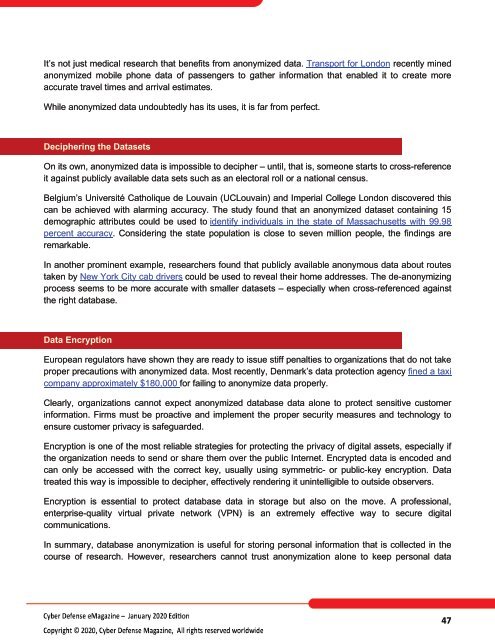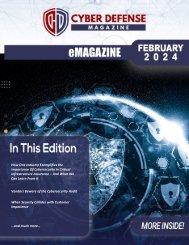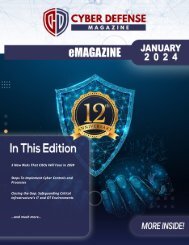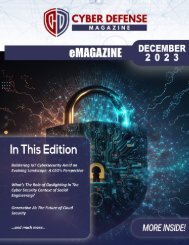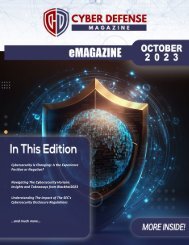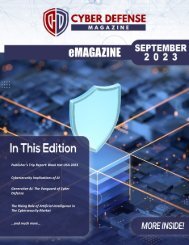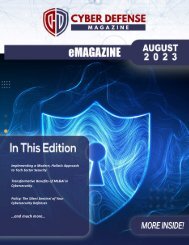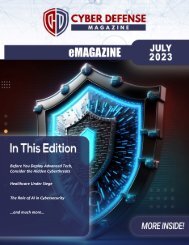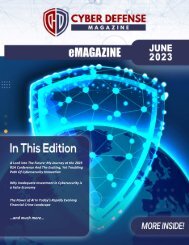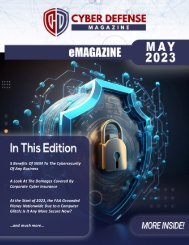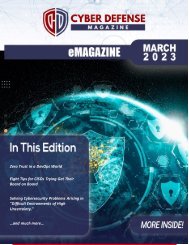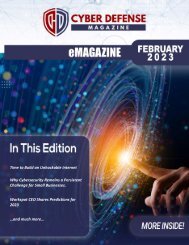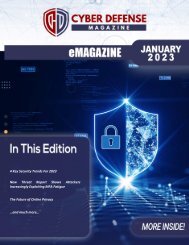Cyber Defense eMagazine January 2020 Edition
Cyber Defense eMagazine January Edition for 2020 #CDM #CYBERDEFENSEMAG @CyberDefenseMag by @Miliefsky a world-renowned cyber security expert and the Publisher of Cyber Defense Magazine as part of the Cyber Defense Media Group as well as Yan Ross, US Editor-in-Chief, Pieruligi Paganini, Co-founder & International Editor-in-Chief, Stevin Miliefsky, President and many more writers, partners and supporters who make this an awesome publication! Thank you all and to our readers! OSINT ROCKS! #CDM #CDMG #OSINT #CYBERSECURITY #INFOSEC #BEST #PRACTICES #TIPS #TECHNIQUES
Cyber Defense eMagazine January Edition for 2020 #CDM #CYBERDEFENSEMAG @CyberDefenseMag by @Miliefsky a world-renowned cyber security expert and the Publisher of Cyber Defense Magazine as part of the Cyber Defense Media Group as well as Yan Ross, US Editor-in-Chief, Pieruligi Paganini, Co-founder & International Editor-in-Chief, Stevin Miliefsky, President and many more writers, partners and supporters who make this an awesome publication! Thank you all and to our readers! OSINT ROCKS! #CDM #CDMG #OSINT #CYBERSECURITY #INFOSEC #BEST #PRACTICES #TIPS #TECHNIQUES
Create successful ePaper yourself
Turn your PDF publications into a flip-book with our unique Google optimized e-Paper software.
47<br />
It’s not just medical research that benefits from anonymized data. Transport for London recently mined<br />
anonymized mobile phone data of passengers to gather information that enabled it to create more<br />
accurate travel times and arrival estimates.<br />
While anonymized data undoubtedly has its uses, it is far from perfect.<br />
Deciphering the Datasets<br />
On its own, anonymized data is impossible to decipher – until, that is, someone starts to cross-reference<br />
it against publicly available data sets such as an electoral roll or a national census.<br />
Belgium’s Université Catholique de Louvain (UCLouvain) and Imperial College London discovered this<br />
can be achieved with alarming accuracy. The study found that an anonymized dataset containing 15<br />
demographic attributes could be used to identify individuals in the state of Massachusetts with 99.98<br />
percent accuracy. Considering the state population is close to seven million people, the findings are<br />
remarkable.<br />
In another prominent example, researchers found that publicly available anonymous data about routes<br />
taken by New York City cab drivers could be used to reveal their home addresses. The de-anonymizing<br />
process seems to be more accurate with smaller datasets – especially when cross-referenced against<br />
the right database.<br />
Data Encryption<br />
European regulators have shown they are ready to issue stiff penalties to organizations that do not take<br />
proper precautions with anonymized data. Most recently, Denmark’s data protection agency fined a taxi<br />
company approximately $180,000 for failing to anonymize data properly.<br />
Clearly, organizations cannot expect anonymized database data alone to protect sensitive customer<br />
information. Firms must be proactive and implement the proper security measures and technology to<br />
ensure customer privacy is safeguarded.<br />
Encryption is one of the most reliable strategies for protecting the privacy of digital assets, especially if<br />
the organization needs to send or share them over the public Internet. Encrypted data is encoded and<br />
can only be accessed with the correct key, usually using symmetric- or public-key encryption. Data<br />
treated this way is impossible to decipher, effectively rendering it unintelligible to outside observers.<br />
Encryption is essential to protect database data in storage but also on the move. A professional,<br />
enterprise-quality virtual private network (VPN) is an extremely effective way to secure digital<br />
communications.<br />
In summary, database anonymization is useful for storing personal information that is collected in the<br />
course of research. However, researchers cannot trust anonymization alone to keep personal data<br />
47


